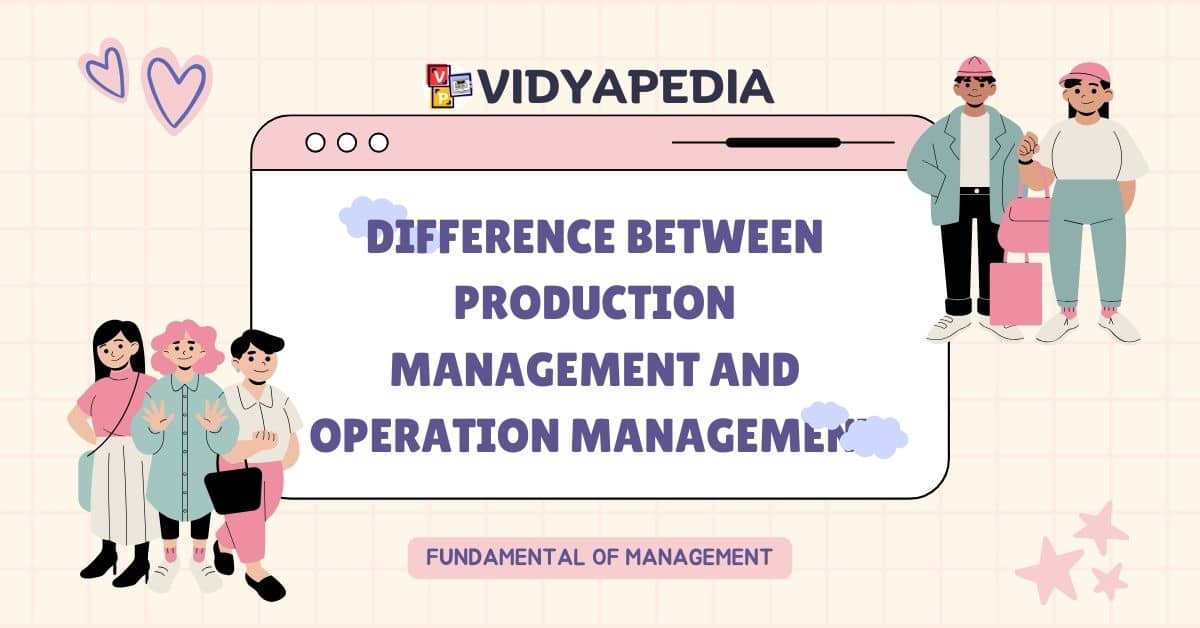Understanding the difference between production management and operation management is crucial for businesses aiming to optimize their manufacturing and overall organizational efficiency. While both disciplines are integral to ensuring smooth operations, they have distinct focuses and responsibilities within the broader field of management.
Read More About Fundamental Of Management
Introduction to Production Management vs Operations Management
Production management revolves around the meticulous coordination and oversight of manufacturing processes within a company. Its primary goal is to streamline production operations, minimize costs, and ensure timely delivery of goods. On the other hand, operations management encompasses a more comprehensive approach, spanning both manufacturing and service operations. It involves strategic planning, resource allocation, and efficiency enhancement across all organizational functions.
Here’s a detailed difference between production management and operation management:
| Aspect | Production Management | Operations Management |
|---|---|---|
| Scope | Focuses on managing manufacturing processes within a firm. | Encompasses a broader range, including both manufacturing and service operations. |
| Focus | Emphasizes the efficient production of goods. | Focuses on optimizing overall organizational operations, including production and service delivery. |
| Objectives | Aims for efficient production, cost minimization, and timely product delivery. | Aims for efficiency across all operational processes, including production, service, and resource management. |
| Responsibilities | Involves production planning, scheduling, quality control, and equipment maintenance. | Includes production planning and strategic planning, supply chain management, inventory management, and more. |
| Integration | Integrates closely with manufacturing processes. | Integrates all aspects of organizational operations, from production to customer service and logistics. |
| Decision Making | Involves tactical decisions related to production processes. | Involves strategic decisions affecting the entire organization, such as resource allocation and process improvement. |
| Complexity | Deals with optimizing production processes within a manufacturing environment. | Deals with managing interconnected systems within the organization, including production, logistics, and more. |
| Skill Sets | Requires expertise in manufacturing processes, quality control, and production planning. | Requires broader skills including strategic thinking, project management, supply chain management, and leadership. |
| Performance Metrics | Measures performance in terms of production output, efficiency ratios, and defect rates. | Uses metrics such as organizational performance, customer satisfaction, inventory turnover, and financial metrics. |
| Industry Application | Traditionally applied in manufacturing industries. | Applicable across various industries including manufacturing, services, healthcare, and retail. |
| Innovation | Focuses on improving manufacturing processes and technology. | Fosters innovation across all operational areas, including product development and service delivery improvements. |
| Flexibility | Aims for efficiency and consistency in production processes. | Aims for flexibility to adapt to changes in market demands, technology advancements, and customer preferences. |
| Risk Management | Focuses on minimizing production-related risks. | Addresses broader organizational risks such as supply chain disruptions and regulatory changes. |
| Customer Focus | Ensures products meet quality standards and are delivered on time. | Ensures overall customer satisfaction through effective service delivery and quality assurance. |
| Resource Allocation | Focuses on cost control within production processes (materials, labour, etc.). | Allocates resources across all operational areas to maximize efficiency and achieve organizational goals. |
| Strategic Alignment | Aligns with operational goals related to manufacturing efficiency and cost control. | Aligns strategic goals with overall organizational objectives, including innovation and market expansion. |
| Regulatory Compliance | Ensures compliance with manufacturing regulations and quality standards. | Ensures compliance across all operational areas, including legal, environmental, and safety regulations. |
| Technology Utilization | Adopts technology to enhance manufacturing processes and productivity. | Utilizes technology across all operational functions, such as CRM systems, ERP systems, and analytics. |
| Supply Chain Management | Coordinates with suppliers for timely delivery of materials and components. | Oversees the entire supply chain from sourcing to distribution, ensuring integration and efficiency. |
| Capacity Planning | Plans production capacity based on demand forecasts and capabilities. | Plans overall capacity utilization across facilities, equipment, and human resources. |
| Quality Management | Focuses on maintaining and improving product quality through quality control. | Ensures quality across all operational processes, including service quality and continuous improvement. |
| Process Improvement | Implements lean manufacturing and Six Sigma for production optimization. | Applies continuous improvement methodologies across all organizational processes. |
| Performance Monitoring | Monitors production performance indicators (cycle time, throughput, etc.). | Monitors organizational performance indicators (financial performance, customer satisfaction, etc.). |
| Environmental Impact | Addresses environmental impact related to manufacturing processes (waste reduction, etc.). | Considers environmental sustainability across all operational activities, including supply chain management. |
| Employee Management | Manages production workforce efficiency, training, and safety. | Manages human resources across all operational areas, including recruitment, training, and development. |
| Strategic Partnerships | Establishes partnerships with suppliers to optimize operations. | Fosters strategic partnerships across stakeholders (customers, suppliers) to achieve mutual goals. |
| Innovation Management | Focuses on incremental improvements in manufacturing processes. | Manages innovation pipelines and fosters a culture of innovation across all operational functions. |
| Cost Management | Focuses on cost control within production processes (materials, labor, etc.). | Manages overall cost efficiency across all operational areas (procurement costs, operational expenses, etc.). |
| Customer Relationship Management | Ensures product quality and delivery meet customer expectations. | Manages customer relationships through effective service delivery and support processes. |
| Leadership Role | Plays a leadership role in managing manufacturing operations. | Plays a strategic leadership role in driving organizational strategy and fostering growth and sustainability. |
This comparison shows how production management and operations management both play an important roles in optimizing processes and attaining organizational goals, with each contributing distinctively to operational excellence and business success. Understanding these distinctions allows organizations to use resources wisely and gain a competitive advantage in the market.



Thanks Sir It’s great
Thanks Sir It’s great